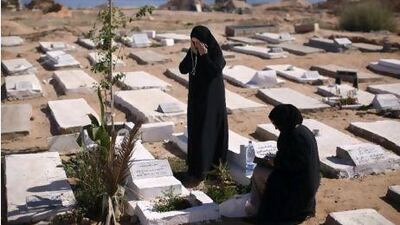The forces of Libya's interim government said yesterday they were closing in on the deposed leader Col Muammar Qaddafi.
"We have a good idea where he is," a senior figure in the National Transitional Council said.
NTC forces also issued an ultimatum to regime loyalists in the fugitive dictator's home town of Sirte, his main remaining bastion: surrender by this weekend or face an attack.
The military commander in Tripoli, Abdel Hakim Belhaj, said Col Qaddafi's son Saadi had called him to negotiate the terms of his own surrender. He told Saadi he would not be harmed and would be treated according to the law, the commander said.
Meanwhile, the French president Nicolas Sarkozy and British prime minister David Cameron will host a meeting of representatives from at least 60 nations in Paris today to discuss Libya's future.
The NTC chairman, Mustafa Abdel Jalil, will open the three-hour session with an outline of the council's roadmap for a new constitution, elections within 18 months and measures to avoid bloodshed of the kind seen in Iraq after Saddam Hussein's fall.
"The objective is to turn the page and get behind the new authority," a French government source said.
"Iraq was a successful military operation, but a failed political transition. We have to learn from that. We have to stand alongside the NTC, but not impose anything on them."
Several nations have asked the UN Sanctions Committee to release billions of dollars in frozen Libyan assets.
"The first priority is to get the Libyan people's money back to their governing authority and to them," the US State Department spokeswoman Victoria Nuland said.
"They are themselves very interested in getting oil flowing again, the gas flowing again. It's a rich country. They want to support themselves, so let's start with getting their money back to them and getting the economy back on track."
The NTC yesterday demanded that Algeria return Col Qaddafi's wife and three of his children who fled there on Monday. Granting asylum to his family, including daughter Aisha, who gave birth in Algeria on Tuesday, was an "enemy act", said Ahmed Al Darrad, the interim government's interior minister.
The NTC have insisted that Col Qaddafi and his family will be tried in Libya, but human-rights activists and lawyers urged them to turn the former dictator over to the International Criminal Court.
Leading the calls was the court's prosecutor, Luis Moreno-Ocampo, who has charged Col Qaddafi with murder and torture in the brutal crackdown on his opponents. Human Rights Watch also called on the leaders meeting in Paris today to push rebel leaders for Col Qaddafi's surrender to the court in The Hague if he is captured.
NTC leaders said they were slowly restoring order in the capital, Tripoli, after a week of fighting, including deploying police and collecting rubbish.
As some Libyans wept over the graves of those killed in their six-month war against Col Qaddafi, others celebrated their newfound freedom with morning prayers and joyous chants in the capital's main square - bittersweet rituals marking the start of the Eid Al Fitr holiday in Libya.
After dawn, worshippers packed Martyrs' Square, which was named Green Square in the Col Qaddafi era, chanting "Allahu Akbar, Libya is free".
In the capital's Souk Al Jumma neighborhood, about 200 people pounded on the doors of a bank, demanding that it open. Civil servants said they were told they would receive a 250-dinar (Dh763) advance on their salaries for the holiday.
"This is the most beautiful Eid and most beautiful day in 42 years," said Hatem Gureish, 31, a merchant from Tripoli. "Qaddafi made us hate our lives. We come here to express our joy at the end of 42 years of repression and deprivation."
Meanwhile, fighting continued in parts of the country. NTC fighters clashed with Col Qaddafi's forces patrolling in the area west of Sirte.
At Tawarga, west of Sirte, civilians streamed in laden vehicles along the coastal highway, some flying white flags.
Passing through a checkpoint set up by NTC forces, many of the refugees said they feared a major battle, because they did not expect those holding Col Qaddafi's tribal homeland to give up without a fight.
"I need to take my family where it is peaceful. Here there will be a big fight," said a man who gave his name as Mohammed.
Ali Faraj, an NTC fighter, said he doubted people in Sirte would willingly join the revolt: "There will be a big fight for Sirte. It's a dangerous city. It's unlikely to rise up. A lot of people there support Qaddafi. It's too close to Qaddafi and his family. It is still controlled by them."
* With reporting by the Associated Press, Agence France-Presse and Reuters

